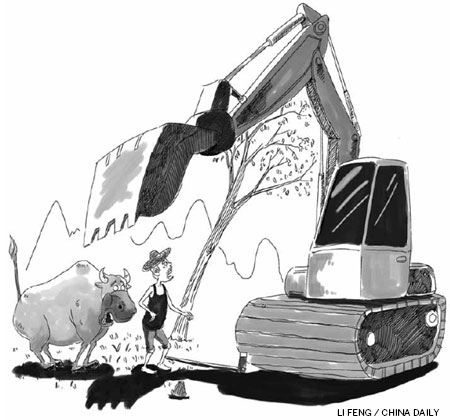You can bet the farm on tradition
Updated: 2013-09-24 07:15
By Li Wenhua (China Daily)
|
||||||||
China is home to a time-honored and rich agricultural civilization, characterized by harmonious economic and ecological values. The rich heritage of traditional agriculture, and the harmony it has established between humans and nature can be used to develop modern agriculture in an eco-friendly way. Villages that practice age-old farming traditions are also the standard bearers of diverse ethnic cultures.
But some important agricultural heritages are being destroyed or neglected thanks to rapid urbanization, fast-paced economic growth, and the spread of modern technology. So, proper protection is needed to prevent traditional villages from the impending doom.
A study conducted by Chinese Village Culture Research Center on traditional villages with historic, ethnic or architectural values across 17 provinces shows on average eight such villages have disappeared every five days between 2004 and 2010. This begs the need for striking the right balance between exploitation and protection of farmland in the process of urbanization, which should be based on respect for traditional agriculture.
The government has to take a series of moves to promote traditional agricultural values in order to better protect these villages. It should conduct a thorough survey on agricultural heritages to get a comprehensive view of the size, type, distribution and condition of the country's traditional agricultural villages. This will help it take specific and targeted protection measures based on the systematic classification of the villages.
And since sustained protection of important agricultural heritages cannot be ensured in the absence of relevant laws and supervision mechanisms, the government has to enact specific laws to this effect. Perhaps an amendment to the Agriculture Law will be needed to fulfill this requirement.
Besides, protection and development of agricultural heritages are not possible without financial help, so the government has to allocate funds for the purpose. In fact, governments at all levels have roles to play in providing financial and policy support to protect traditional agricultural practices and in guiding enterprises and NGOs in playing their part in the endeavor.
The basic aim of the players engaged in the endeavor, however, should be to ensure that the self-development of the "heritage" villages, especially the benefits accrued from local industries' production, and ecological and cultural development, can ultimately become the main source of the funds needed to protect them.
It is very important for the government to pay equal attention to heritage conservation and economic development. Commercialization of cultural heritage is not a bad thing if it uses the attraction of scenic spots to generate benefits for local economies. But commercialization should be based on the cultural elements, not on the blind pursuit of profit.
It is crucial to involve communities in the mission to protect "heritage" villages, which are living sites with high productive and ecological functions that help farmers lead a sustainable existence. Therefore, farmers should be allowed to play the role of guardians and heirs of these cultural heritage sites.
The authorities need to realize that the country's rich agricultural heritages cannot be preserved by housing them in museums and relocating farmers to cities or other areas.
There is need for the government to guide farmers and residents of "heritage" villages to play a proactive role in the protection of traditional agriculture by developing eco-friendly tourism and agriculture, and handicraft and cultural industries.
The government also needs to develop modern eco-friendly agriculture by using the approach of traditional agriculture. It should attach importance not only to the protection of traditional farming resources, but also to the improvement of the living standards of farmers, because without their help traditional agriculture cannot survive.
Organic agriculture and eco-friendly tourism could be used to help improve the living standards of the residents of the "heritage" villages and to promote the diverse functions of agricultural heritage.
Moreover, for rural development and protection of traditional villages, the authorities need to borrow some ideas from other countries.
Many European countries have preserved traditional villages because they respect history and tradition and, at the same time, use them to encourage innovation. These countries have shown the benefits of using eco-friendly tools for the development of traditional villages.
France, for example, is one of the most industrialized countries in the world but it is also home to a large number of traditional villages. And some of the agricultural and other products that these villages produce are world famous brands.
Leisure agriculture, as promoted in some Taiwan villages, is another way traditional agricultural villages on the Chinese mainland could be protected, because the practice integrates production, life and ecology, and exploits natural resources to the least possible extent.
There is little doubt that Chinese government has nothing to lose but a lot to gain by protecting villages and villagers that practice traditional, eco-friendly agriculture.
The author is an academic at the Chinese Academy of Engineering and International Eurasian Academy of Sciences.

(China Daily 09/24/2013 page9)
Most Viewed
Editor's Picks

|

|

|

|

|

|
Today's Top News
Maduro aims to build trade plan with China
Sino-US college venture focuses on public health
Shanghai regulates govt-funded overseas training
Hong Kong kungfu drama to compete for Oscar
China to help deal with chemical weapons
Court media officers get greater say
Spending cuts on official meetings
Employee claims Danone gave bribes
US Weekly

|

|













